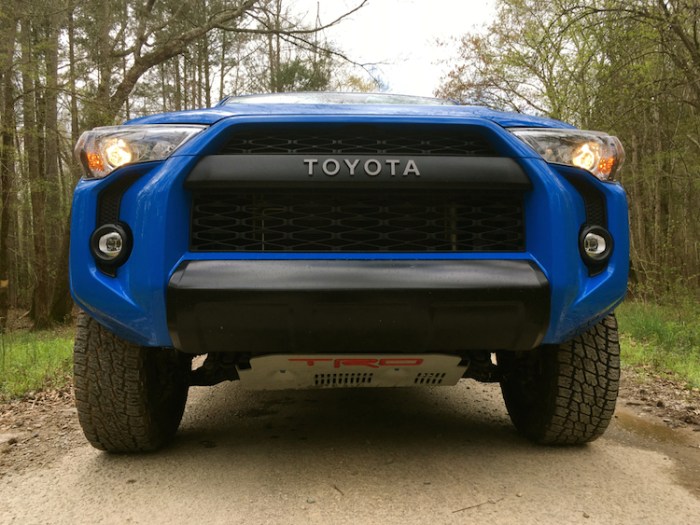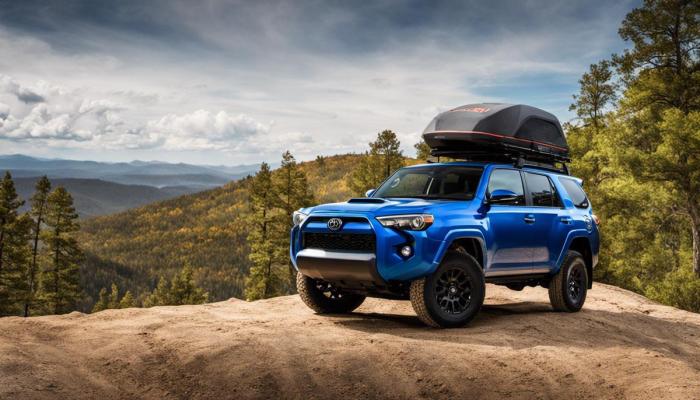How the Toyota 4Runner Stacks Up Against Other Off-Road Vehicles – The Toyota 4Runner, a long-standing icon in the SUV world, enjoys a reputation for rugged capability and off-road prowess. But how does it truly measure up against its competitors in the fiercely contested off-road vehicle market? This comprehensive guide delves deep into the 4Runner’s strengths and weaknesses, comparing it to other popular choices to help you make an informed decision.
Comparing the Toyota 4Runner: Key Competitors and Features
The 4Runner’s primary competitors often include Jeep Wrangler, Ford Bronco, and even the Jeep Gladiator (if a pickup truck configuration is considered). Each vehicle offers a unique blend of capabilities, targeting different aspects of the off-road experience. Let’s break down a comparative analysis based on key features:
Off-Road Capability: Articulation, Ground Clearance, and Drivetrain
- Toyota 4Runner: Boasts a robust body-on-frame construction, providing excellent rigidity and articulation. While ground clearance is good, it’s not class-leading. The available part-time four-wheel-drive system, though reliable, lacks the sophistication of some competitors’ full-time systems. Its approach, breakover, and departure angles are respectable, but not always best-in-class.
- Jeep Wrangler: Renowned for its legendary articulation and maneuverability, thanks to its live axles and short wheelbase. Offers superior ground clearance and approach/departure angles. Various drivetrain options are available, including advanced systems with locking differentials.
- Ford Bronco: A strong contender, offering a similar body-on-frame construction to the 4Runner. Features impressive ground clearance and articulation, often exceeding the 4Runner. The independent front suspension offers a smoother on-road ride, while various drivetrain options cater to different off-road needs.
- Jeep Gladiator: The pickup truck option adds significant payload and towing capacity. Shares many off-road strengths with the Wrangler, but the longer wheelbase reduces articulation slightly.
On-Road Comfort and Refinement
- Toyota 4Runner: While capable off-road, the 4Runner’s on-road manners are less refined than its competitors. The ride can be firm and bumpy, particularly on rougher surfaces. Noise isolation is also not its strongest suit.
- Jeep Wrangler/Gladiator: Both offer a noticeably rougher on-road experience compared to the others. Ride quality is compromised for off-road capability.
- Ford Bronco: Strikes a better balance between on-road comfort and off-road performance. The independent front suspension contributes to a more comfortable ride compared to the 4Runner and Jeeps.
Technology and Features
- Toyota 4Runner: While continuously updated, the 4Runner’s infotainment system lags behind some competitors in terms of user-friendliness and features. Safety technology is present, but might not be as comprehensive as in some newer SUVs.
- Jeep Wrangler/Bronco/Gladiator: These models typically offer more modern infotainment systems with larger touchscreens and advanced features like Apple CarPlay and Android Auto. Safety features are generally more advanced and comprehensive.
Reliability and Resale Value, How the Toyota 4Runner Stacks Up Against Other Off-Road Vehicles
- Toyota 4Runner: Toyota’s reputation for reliability is well-deserved. The 4Runner consistently ranks high in reliability surveys, and its strong resale value reflects this.
- Jeep Wrangler/Bronco/Gladiator: Reliability can vary across models and years. While generally durable, these vehicles can have some reported issues. Resale value is strong for popular models and trims.
Toyota 4Runner Specifics: Strengths and Weaknesses: How The Toyota 4Runner Stacks Up Against Other Off-Road Vehicles
The 4Runner’s enduring popularity is not without reason. Its strengths lie in its:
- Robust Body-on-Frame Construction: Provides exceptional durability and rigidity, crucial for serious off-roading.
- Reliability and Longevity: Toyota’s reputation for building reliable vehicles is well-earned by the 4Runner.
- Strong Resale Value: Holding its value well over time, making it a smart financial choice.
- Available Features: Offers features like Crawl Control, Multi-Terrain Select, and Kinetic Dynamic Suspension System (KDSS) for enhanced off-road performance.
However, the 4Runner also has some limitations:
- Outdated Technology: The infotainment system and some driver-assistance features lag behind competitors.
- Fuel Economy: Fuel efficiency is not a strong point, especially considering its V6 engine.
- On-Road Ride Quality: The ride can be harsh and bumpy on paved roads.
- Limited Passenger and Cargo Space: Compared to some competitors, the 4Runner offers less interior space.
Frequently Asked Questions (FAQ)
- Q: Is the Toyota 4Runner good for off-roading? A: Yes, the 4Runner is a capable off-road vehicle, particularly in moderate to challenging terrain. Its body-on-frame construction and available off-road technologies contribute to its capabilities.
- Q: How does the 4Runner compare to the Jeep Wrangler? A: The Wrangler generally offers superior articulation and ground clearance, while the 4Runner provides more on-road comfort and potentially better reliability. The choice depends on prioritizing off-road prowess versus on-road manners.
- Q: What are the 4Runner’s biggest drawbacks? A: Outdated technology, relatively poor fuel economy, a harsh ride on paved roads, and limited passenger/cargo space are some key drawbacks.
- Q: Is the 4Runner a good value for its price? A: Considering its reliability and resale value, the 4Runner can be a good value, particularly for buyers prioritizing longevity and off-road capability. However, the lack of certain modern features might impact its value proposition for some buyers.
- Q: What are the different trims available for the Toyota 4Runner? A: The 4Runner offers several trims, each with varying features and capabilities. These include SR5, TRD Off-Road, TRD Pro, and Limited, with each offering a unique blend of features and capabilities.
Conclusion
The Toyota 4Runner holds a unique position in the off-road market. While not necessarily the best in every category, its combination of rugged capability, reliability, and strong resale value makes it a compelling choice for many buyers. However, prospective owners should carefully weigh its strengths and weaknesses against competing models like the Jeep Wrangler, Ford Bronco, and Jeep Gladiator to determine if it best fits their needs and preferences.
Consider your priorities – on-road comfort, off-road capability, technology, and budget – to make the right decision.
Call to Action
Ready to explore the Toyota 4Runner or its competitors further? Visit your local dealership for a test drive and experience the capabilities firsthand! You can also research specific models and trims online to find the perfect fit for your adventure.
FAQ Compilation
What is the 4Runner’s towing capacity?
The towing capacity varies depending on the year and trim level but generally ranges from 5,000 to 7,000 lbs.
How reliable is the Toyota 4Runner?

Source: autotrends.org
The 4Runner generally enjoys a strong reputation for reliability, often ranking highly in owner satisfaction surveys.
What are the common maintenance issues with the 4Runner?
Common issues can include potential problems with the transmission, suspension components, and electrical systems, though the frequency varies by year and model.

Source: enginepartsdiagram.com
How does the 4Runner’s fuel economy compare to competitors?
Fuel economy is typically lower than many competitors, reflecting its rugged design and capabilities.
